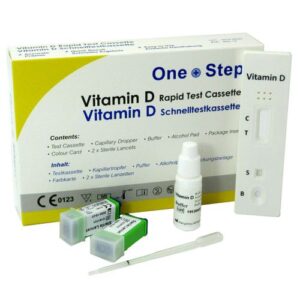One of the most vital vitamins in the human body is vitamin D, also known as the ‘sunshine vitamin’. It helps to keep our bones healthy, provides normal muscle function and boosts the immune system. It is also critical in cell division. The more research that has been done on vitamin D, the more important roles it seems to play in the body.
At least 25% of UK residents have a vitamin D deficiency. This means that the absorption of calcium into the bones is disrupted. As a result, children can experience rickets and adults could experience pain or tenderness in their bones. A lack of Vitamin D has even been linked to Parkinson’s Disease.
Vitamin D is a common deficiency worldwide, especially in pregnant women. A Vitamin D Deficiency Test Kit can quickly ascertain if you are lacking in Vitamin D.

How Do Pregnant Women Get Enough Vitamin D?
Vitamin D is naturally occurring in some foods like mushrooms, eggs and oily fish. Vitamin D is difficult to get through just food. The best form of vitamin D is sunlight during summer, but you have to be careful to keep the skin safe during this time. During the winter months, vitamin D is greatly reduced. At this time of year, you will need to work on ways to avoid a Vitamin D deficiency.
It is recommended by the UK department of health that people should take a daily vitamin D supplement, especially pregnant women, breastfeeding mothers and children. This is especially critical during the winter months from October to March. Vitamin D3 can be taken in capsule or tablet form. Brands such as Vitabiotics also market an Ultra Vitamin D supplement.
The Importance Of Vitamin D During Pregnancy
More and more research is being done on vitamin D during pregnancy and how it impacts the mother and baby. The Wellbeing of Women supports this research. They are a medical research charity focused on women and children.
A University of Birmingham study done by Dr. Jennifer Tamblyn reveals that besides the important role vitamin D plays in maintaining strong bones in a mother and growing baby, it also plays a vital role in the health of the placenta. This is extremely important as the placenta supplies the baby with essential nutrients.
The study showed that when vitamin D is lacking, the placenta malfunctions and when vitamin D is present, it boosts the response of the placenta’s immune cells.
The side effects of the placenta malfunctioning include miscarriage, preclampsia and premature birth. The research seems to show that adding vitamin D during pregnancy is just as critical to the baby’s health as taking folic acid.
Recommended Daily Amount Of Vitamin D
The recommended daily amount of vitamin D for pregnant women is 400 IU (10 micrograms). This is double the amount recommended for most adults, which reflects the increased need during pregnancy. Despite this, studies show that many pregnant women still have inadequate levels of vitamin D. One study found that nearly half of pregnant women in the UK had deficient levels in their third trimester.
There are several reasons why vitamin D deficiency is common in pregnancy:
- Limited sun exposure – Staying indoors more often and using sunblock outside can reduce vitamin D production in the skin.
- Increased demand – The growing baby requires more vitamin D for proper skeletal development. The mother’s body needs more to support changes in calcium metabolism.
- Morning sickness – Some women have trouble keeping prenatal vitamins down in early pregnancy when nausea and vomiting are most common.
- Darker skin – Melanin reduces the skin’s ability to make vitamin D from sunlight. Deficiency is more prevalent among women with darker complexions.
- Obesity – Vitamin D is fat-soluble and can become sequestered in fat stores. Obese women have lower levels of bioavailable vitamin D.
- Geographic location – Living farther from the equator decreases sun exposure, so mothers in northern latitudes are more prone to deficiency.
The Impacts Of Vitamin D Deficiency During Pregnancy Include:
- Impaired foetal skeletal formation – Vitamin D is essential for calcium absorption and bone growth in the developing baby.
- Deficiency can lead to growth retardation, bone defects, and skeletal deformities.
- Preeclampsia – Low vitamin D is associated with an increased risk of high blood pressure disorders like preeclampsia.
- Gestational diabetes – Some research indicates vitamin D deficiency may predispose pregnant women to developing gestational diabetes
- Preterm birth – Severe deficiency has been linked to a higher rate of premature delivery.
- Low birth weight – Infants born to mothers with very low vitamin D levels are more likely to have lower birth weights.
- Increased C-section risk – There is an association between vitamin D deficiency and higher rates of caesarean sections. The reasons for this link are still unclear.
- Postpartum depression – A few studies suggest that low vitamin D may increase the risk of maternal depression after giving birth.
Due to the central role vitamin D plays in maternal and infant health, testing levels in early pregnancy can help prevent complications. Doctors may recommend more aggressive supplementation for deficient mothers to ensure adequate intake is achieved. All women are advised to continue taking prenatal vitamins with vitamin D throughout pregnancy and breastfeeding. Obtaining sufficient levels helps minimize significant health risks for both mother and baby.
Ensuring proper vitamin D levels during pregnancy is crucial, but many mums-to-be struggle to get enough from diet and sun exposure alone. A simple vitamin D supplement can make a world of difference. Look for vitamin D3 (cholecalciferol), the most bioavailable form. For example, the Vitabiotics Ultra Vitamin D tablets provide an optimal 3,000 IU dose in an easy-to-take capsule. Just one daily with a meal supports both your needs and your growing baby’s.
Don’t worry if morning sickness makes taking pills difficult early on. As things settle, be sure to start your vitamin D supplement. It could help reduce your risk of complications like preeclampsia and gestational diabetes. Plus, it supports your little one’s skeletal and immune development. Getting adequate vitamin D gives your baby the best possible start.
Photo “How Important Is Vitamin D During Pregnancy” by Anthony Cunningham for Zoom Health
Zoom Health is a leading UK supplier of Home Health Tests and Earplugs





